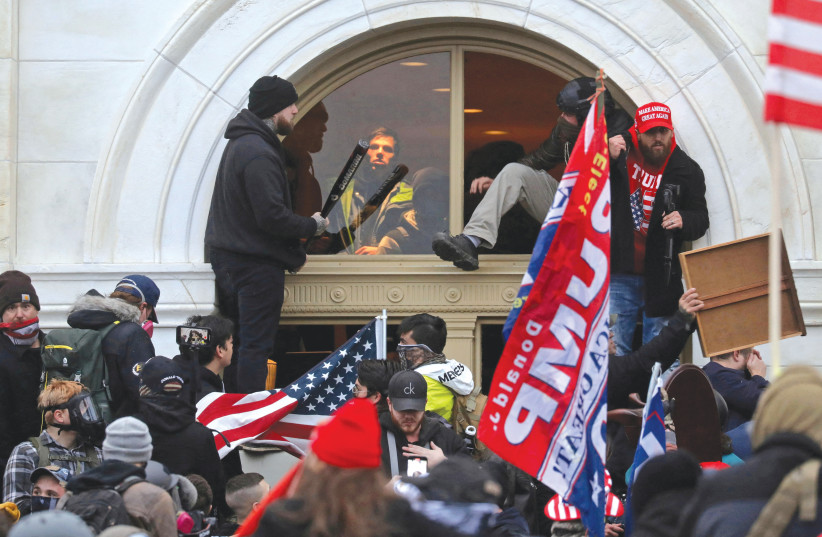You don’t need to be a Jew to be a Zionist: President Joe Biden’s words resonated. The US commitment to the State of Israel, he affirmed, goes beyond self-interest.
There are those who came to Israel, when the state was established, who had lost everything. Nothing mattered more than the promise of a country that would welcome and nurture them – a promise that they now call into question, not only for themselves but also for their children and grandchildren.
We are told the relationship between Israel and the US is special; an enduring friendship based not only on mutual security, but also on shared values rooted in our democracies. It is a friendship often tested by Israel’s pursuit of the former (security) and, more recently, US efforts to ensure the latter (democracy). Upholding the rights of minorities and equality are the core fibers of democratic society that both strengthen and cause tension in equal measure, as competing interests come into play.
But those fibers must be nurtured and protected from the human impulse toward self-interest. It is crucial for us to retain our humility and acknowledge when we’re getting it wrong – when we’re blinded by the divisions between us, rather than drawn toward those things which bind us.
The fibers within our countries have frayed. The January 6 US Capitol attack was an echo from history, reminding us of the depths to which people will sink.

That violent assault in 2021 on the US Capitol was fueled by a campaign of deception promoted by a president in violation of his oath to the nation he swore to serve. Donald Trump’s self-serving lies led to deaths and injuries, even among his own supporters. His actions surrounding the events of that day are now a matter of public record.
MORE RECENTLY, as unprecedented numbers of Israelis reject the authoritarian direction their government has taken under Prime Minister Benjamin Netanyahu, urgent calls have gone out to Diaspora Jews for help.
How Netanyahu lied and pulled the strings of the American public
Netanyahu’s recent appearances across US media were notable for a variety of reasons, not least because of his reluctance to appear before the Israeli media.
He sought to disabuse the Americans of their perception that Israelis were discontent with his leadership. Concerns with the changes he endorses to Israel’s judicial system, he told us, are overblown.
According to Netanyahu, the recently enacted restriction limiting the Supreme Court’s power regarding the reasonableness standard is a minor tweak needed to restore proper balance among the three branches of government. He’d have Americans believe that it’s the Supreme Court that’s gone rogue, as unelected judges overreach by overturning decisions of Israel’s democratically elected legislative and executive branches.
As an American, what I found interesting was the fact that Netanyahu pulled the strings of my fellow countrymen for whom democracy is sacrosanct. For most Americans, the separation of powers among the three branches of government, and the desire to keep activist judges in check, is paramount. In making his case for Israel’s ailing democracy, Netanyahu touched on the outrage that would inevitably flow should the US Supreme Court overturn an amendment to the US Constitution. But what I found most notable was what he didn’t say.
Surely, his understanding of the US system hadn’t failed him. There was, however, no mention that three branches of US government ensure four separate, independent checks on abuses of power. Among them, each house of our bicameral legislature is determined by voters in elections separate not only from each other, but also from the executive branch.
Similarly without mention, both houses of Congress operate under rules also separate from each other, as well as from the executive and judicial branches.
The following also received no mention:
- The US Supreme Court, from time to time, rules against provisions enacted by other democratically elected branches.
- Jurists in the US Supreme Court, as in Israel, are appointed, not elected.
- The directive from Israel’s 1948 Declaration of Independence to adopt a constitution no later than October 1 of that year remains unfulfilled.
SUCH CHERRY-picking for his US audience belied the very different reality now confronting Israelis.
Any practical separation of powers between the Netanyahu executive and Knesset branches is wafer thin, since the same coalition parties determine control in both. Because of this, the judiciary must be allowed to provide the necessary checks and balances on the government to ensure basic rights for all Israelis.
In papering over such inconvenient truths before his US audience, Netanyahu sidestepped the critical distinction between governing by mutually agreed rules and norms necessary for a vibrant democracy, and unilaterally discarding them.
Ignoring that distinction is the first step toward weaponizing an election in furtherance of such unilateral changes – a weaponization from which the US remains in the process of recovery.
Moreover, winning an election in the US and Israel provides neither protection from criticism, nor license to decide who is an anarchist or traitor – a point Netanyahu and Trump seem to have forgotten. It is the responsibility of those in office to address the needs of all their people, regardless of whether they voted for them or not.
The writer, neither Israeli nor Jewish, believes in the legitimacy of Israel and its aspiration as a Jewish and democratic state. As an American grappling with the national trauma of Donald Trump’s deceit, he fears that Benjamin Netanyahu’s recent behavior places Israel’s relationship with the US, and the lives of three generations of Israelis, at risk.
